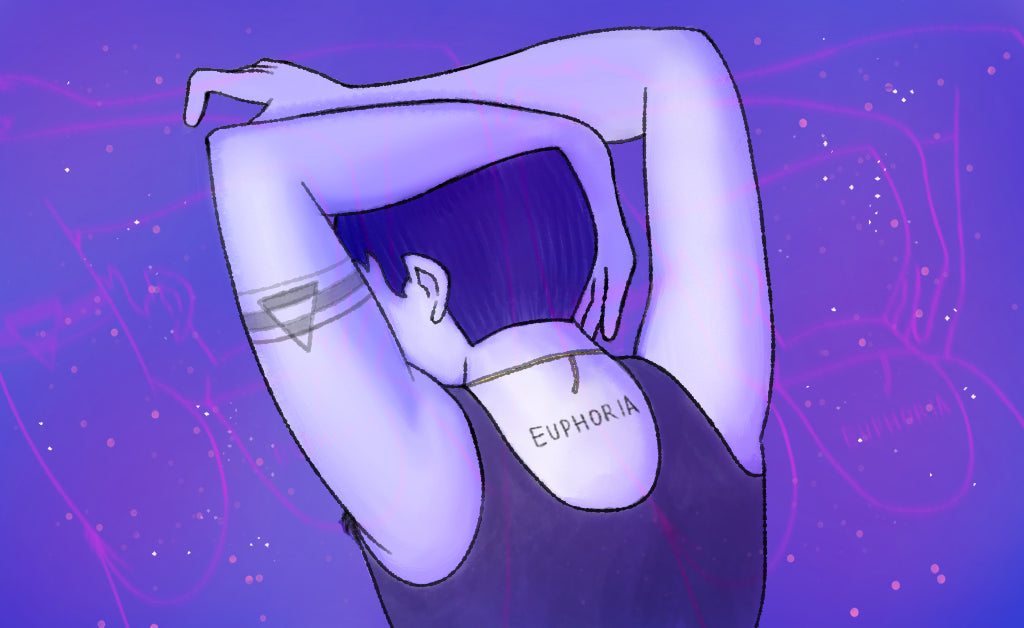
How Testosterone Affects Your Cycle
Share
 Unless you’re talking with a doctor or getting tips from friends who have experience with testosterone (T), it can be difficult to fully understand what symptoms to expect when you’re thinking about transitioning. You can do your research and discuss with others, but testosterone’s symptoms and side effects can manifest differently for everyone. Some people might grow hair in unexpected places or lose it, and others might get acne or mood swings–it all depends on the individual.
Unless you’re talking with a doctor or getting tips from friends who have experience with testosterone (T), it can be difficult to fully understand what symptoms to expect when you’re thinking about transitioning. You can do your research and discuss with others, but testosterone’s symptoms and side effects can manifest differently for everyone. Some people might grow hair in unexpected places or lose it, and others might get acne or mood swings–it all depends on the individual.
One thing that isn’t discussed often is what happens to your menstrual cycle. Will it get lighter, heavier, or disappear completely? This impact is an important factor for many people considering going on T as the menstrual cycle can be a point of discomfort for a lot of trans and nonbinary folx. Knowing what to expect can help you make decisions to help find and maintain gender euphoria.
What is Testosterone
Testosterone is a steroid hormone that stimulates the development of male secondary sexual characteristics produced in the testes, ovaries, and adrenal cortex. It is present in the testicles and ovaries. So, for people with vaginas, testosterone is already present and works with progesterone and estrogen to move the menstrual cycle along.
Upping your testosterone levels can have a few different effects depending on the rest of your hormones.
How Does Testosterone Affect the Cycle?
Within your cycle, testosterone works with estrogen to boost libido during ovulation and even during your period. So, if you find yourself especially ready to play (horny) around that time of the month, that’s the natural effect of your testosterone levels. When you add more testosterone, you may see a further increase in libido, especially after the first week of your period.
You may also see your PMS symptoms get better. Some individuals report less cramping and lighter, shorter periods overall. Others find that their period stops altogether, though this isn't definite. On the other side, you could see your PMS symptoms worsen. On testosterone, it is possible to experience heavier periods with more painful cramping. Some menopausal people have reported lighter periods but with hot flashes.
The side effects of T vary greatly from individual to individual. Its potentially positive effects on the menstrual cycle certainly drive many people to begin testosterone as their period may bring on dysphoria.
Other Things to Keep in Mind
Depending on the person, achieving gender euphoria may outweigh the potential effects on the cycle. Many trans and nonbinary folx prefer the elements that come with the hormonal change, even if it doesn’t take away their periods.
Although T disrupts or eradicates your period, that doesn’t mean you’re entirely free from potential risks associated with your menstrual cycle. Some trans and nonbinary folx have ended up pregnant because they believed they could no longer conceive. So if you’re on testosterone, this doesn’t mean you should give up on your contraceptives, and you should talk to your doctor if you are worried about a potential pregnancy.
If your testosterone treatment is not changing your period how you prefer, you might want to look into birth control options that will lighten or adapt your cycle. Options like a hormonal IUD may help lighten your period or rid of it completely. A hormonal IUD would also work to ensure that pregnancy doesn’t occur unless you want it to.
Just as everyone’s experience with gender is different, what you want out of your journey on T will vary as well. It’s difficult to pin down what to expect from T, but it is worth trying to help achieve gender euphoria. And, keep in mind, if you don’t get the desired results right away, don’t be discouraged and talk to your doctor about anything you might be experiencing.

